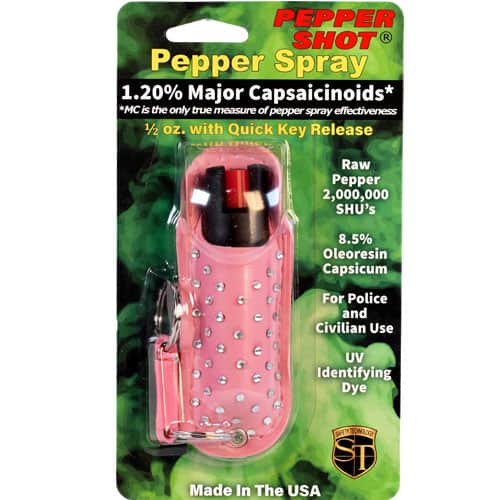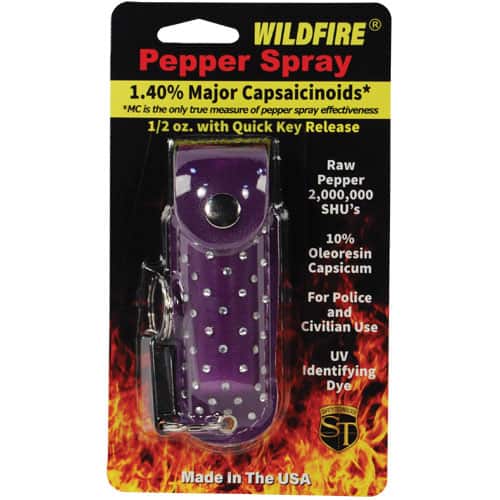Pepper Spray Does Have Serious Side Effects
Can pepper spray make you sick? In short, yes. Its active component, capsaicin, derived from chili peppers, sparks not just a fiery sensation but also severe discomfort. You might experience burning skin, eye irritation, coughing, or even temporary blindness. More intense reactions include nausea, vomiting, and respiratory distress. Don’t take these symptoms lightly—seek medical help if they persist or worsen.
Remember, how you react to pepper spray varies, especially if you have underlying health issues. Stay informed on safe handling practices to avoid accidental exposure. By staying alert and prepared, you’ll minimize risks and keep yourself safe. Dive deeper, and you’ll uncover even more insights on managing these situations. Also remember, that these side effects make pepper spray an effective weapon against an attacker!
Key Takeaways
- Pepper spray contains capsaicin, which can cause nausea, vomiting, and stomach pain.
- Exposure can lead to severe respiratory distress and chest pain.
- Symptoms such as temporary blindness and severe eye irritation may occur.
- Severe reactions require immediate medical attention to avoid life-threatening complications.
- Even with minor exposure, symptoms like coughing and skin burning sensation are common.
Understanding Pepper Spray


Pepper spray, a common self-defense tool, contains capsaicin, which can cause severe discomfort and sickness when you’re exposed. This potent chemical, derived from oleoresin capsicum, is the same ingredient that gives chili peppers their fiery bite. When it’s compacted into a canister and becomes your line of defense, it’s no joke. The active ingredient, capsaicin, isn’t something to mess with. Unlike tear gas, which is a chemical compound, pepper spray uses a naturally occurring substance, but don’t let that fool you. The effects can be just as intense.
Exposure to this defense spray can lead to an array of reactions. You’ve probably heard it can stop an attacker in their tracks, and that’s because it’s designed to. The immediate impact includes respiratory discomfort, skin burning, and intense eye irritation. The goal is to incapacitate, giving you time to escape a threat. However, it’s essential to understand the power you hold in your hand. This isn’t just another spray; it’s a potent tool that demands respect and awareness of its capabilities. Knowing how and when to use it can make all the difference in a dangerous situation.
Pepper Shot and WildFire (both pictured above) are 2 popular pepper spray brands available at Nittany Self Defense. When handled safely, they are very effective weapons for personal protection. For more information about how to safely use pepper spray, watch this informative video.
Common Symptoms
When exposed to pepper spray, you’ll likely experience symptoms such as eye irritation, a burning sensation on your skin, coughing, and even temporary blindness. It’s no walk in the park. Pepper spray doesn’t discriminate; it’s meant to incapacitate, and it does its job well. If it gets in your eyes, expect intense irritation and a sensation that might feel like your eyes are on fire, leading to temporary blindness that, although it subsides, feels like an eternity during the moment.
If you accidentally ingest pepper spray, you’re in for a rough ride. Nausea, vomiting, and stomach pain are common symptoms that can knock you off your feet. It’s as unpleasant as it sounds, turning your insides out and leaving you wishing you’d never encountered the spray.
Inhaling pepper spray isn’t any better. It can cause respiratory irritation, difficulty breathing, and more coughing. Imagine feeling like you can’t catch your breath, each inhale bringing more discomfort than relief.
Direct contact with the skin isn’t a picnic, either. You might experience redness, blistering, and irritation that makes you regret not avoiding exposure in the first place.
Severe Health Risks
While most encounters with pepper spray result in temporary discomfort, severe reactions can pose significant health risks that demand immediate medical attention. If you’re exposed to pepper spray, it’s vital to recognize when a reaction veers from uncomfortable to dangerous.
Here are 3 key severe health risks associated with pepper spray exposure:
- Respiratory Distress and Chest Pain: Inhalation can lead to difficulty breathing or even respiratory arrest, especially in individuals with asthma or COPD. Chest pain may also occur, signaling potential heart complications.
- Temporary Blindness and Severe Eye Irritation: Direct contact can cause temporary blindness or significant eye pain, necessitating professional medical evaluation to prevent lasting damage.
- Life-Threatening Complications: In rare cases, exposure can exacerbate symptoms of pre-existing lung conditions or trigger arrhythmia, leading to critical, potentially fatal outcomes.
It’s imperative to understand that while pepper spray is a non-lethal self-defense tool, its effects can be severe, especially if you have underlying health issues like asthma or COPD. Severe symptoms like respiratory distress, chest pain, or prolonged temporary blindness are red flags. In these situations, seeking immediate medical help isn’t just advisable; it’s necessary.
Seeking Medical Help
If you’re experiencing persistent or worsening symptoms after being exposed to pepper spray, it’s important to seek medical help immediately. Symptoms like eye irritation, skin redness, coughing, temporary blindness, nausea, and difficulty breathing shouldn’t be taken lightly. They’re your body’s way of telling you something’s wrong, and ignoring them could make things worse.
Seeking medical help allows healthcare professionals to assess the severity of your symptoms and offer the appropriate treatment for any sickness caused by pepper spray exposure. They’re equipped to handle the various reactions your body might’ve and can provide relief from the discomfort and potential complications.
Prevention and Safety
To safeguard your health from the adverse effects of pepper spray, it’s important to adopt preventive measures and prioritize safety in its use, storage, and disposal. Pepper spray can cause eye irritation, skin discomfort, and respiratory issues. Handling it with care is essential to avoid these unwanted consequences.
Here’s what you can do to stay safe:
- Proper Use and Storage: Always follow the manufacturer’s instructions for using and storing pepper spray. Keep it out of reach of children and in a secure location to prevent accidental discharge.
- Immediate Decontamination: If exposed, seek fresh air immediately and wash the affected area with soap and water. Avoid touching your eyes or face, and remove contaminated clothing to reduce the risk of secondary sickness.
- Consult Professionals: In case of exposure or if you’re unsure about the safe handling and disposal of pepper spray, don’t hesitate to reach out to Poison Control or your local health department for guidance.
Frequently Asked Questions
How Long Do Side Effects of Pepper Spray Last?
The side effects of pepper spray typically last from 30 minutes to several hours. For immediate relief, follow post-exposure care and safety tips. Recovery timelines vary, influenced by environmental factors and personal stories.
What Are the Symptoms of Being Pepper Sprayed?
If you’re pepper sprayed, you’ll face eye irritation, skin redness, breathing difficulty, and possibly panic attacks. Expect temporary blindness, coughing fits, severe headache, nasal discharge, increased anxiety, and allergic reactions as part of the ordeal.
Will Pepper Spray Cause Permanent Damage?
Pepper spray could cause permanent damage, especially with severe exposure. It’s essential to follow safety protocols, understand manufacturer differences, and consider alternative defenses. Recovery tips and immediate medical attention help minimize risks. Always store it safely.
Can Pepper Spray Hurt Your Stomach?
Yes, pepper spray can hurt your stomach, causing cramps and nausea. You’ll need dietary precautions, herbal remedies, and possibly a medical consultation. Stay hydrated, avoid acidic foods, manage pain, and choose recovery meals carefully for relief.


